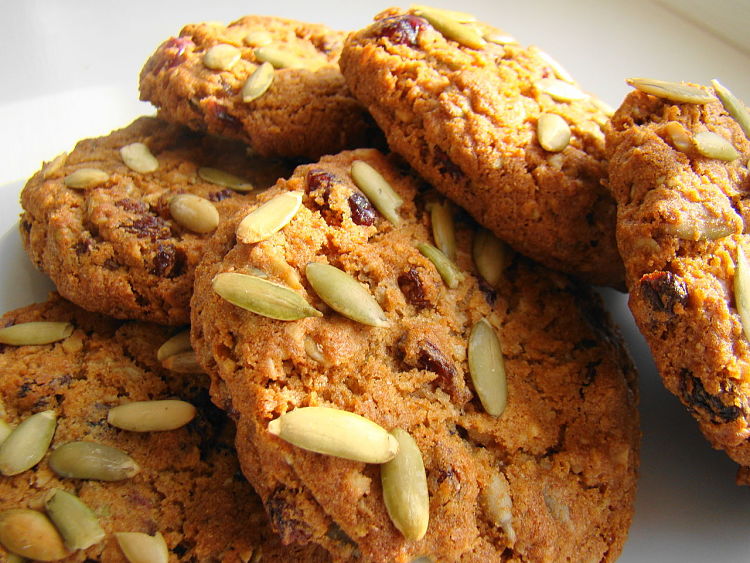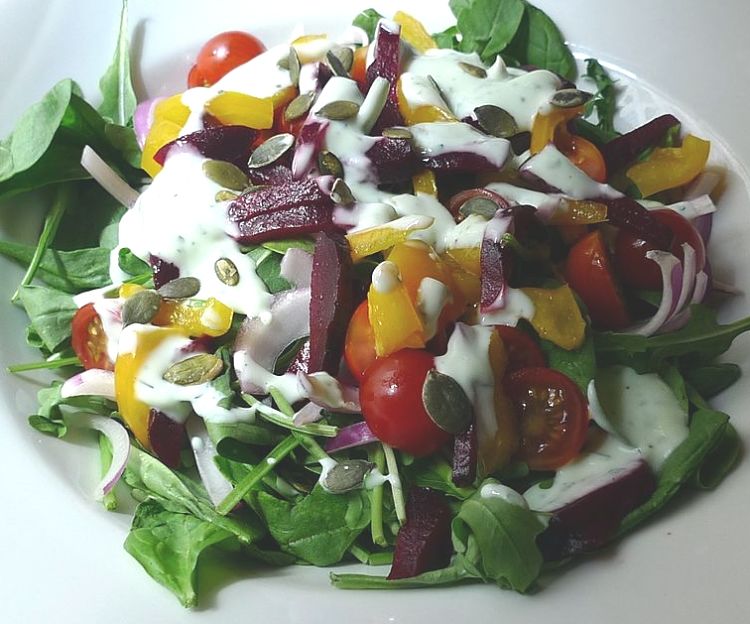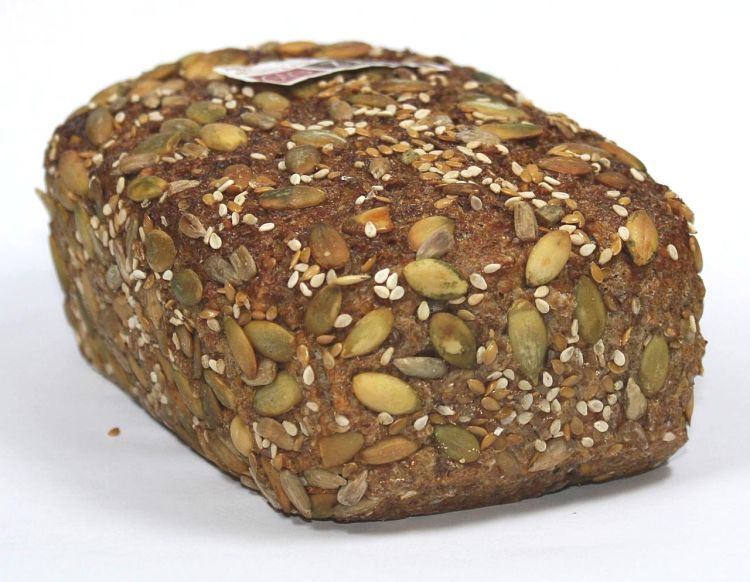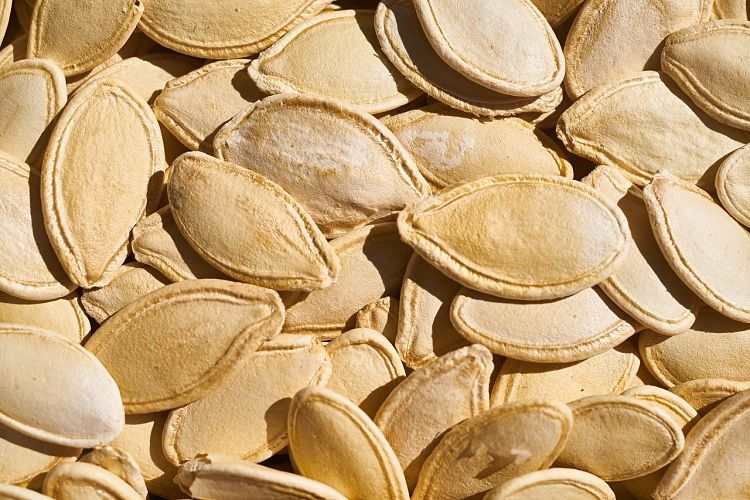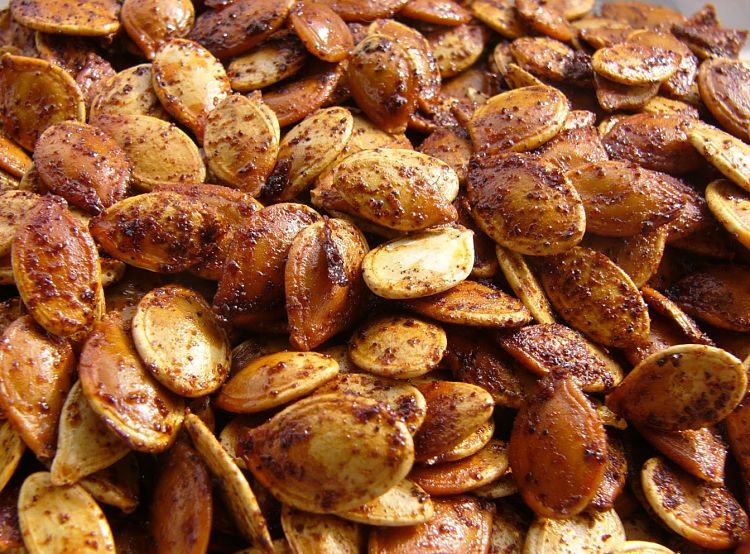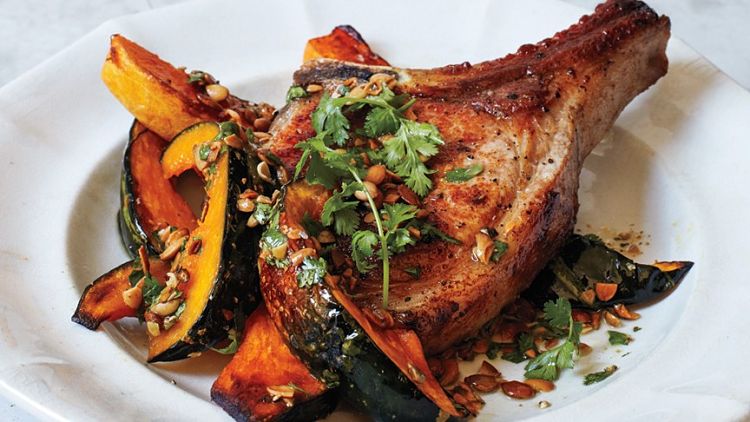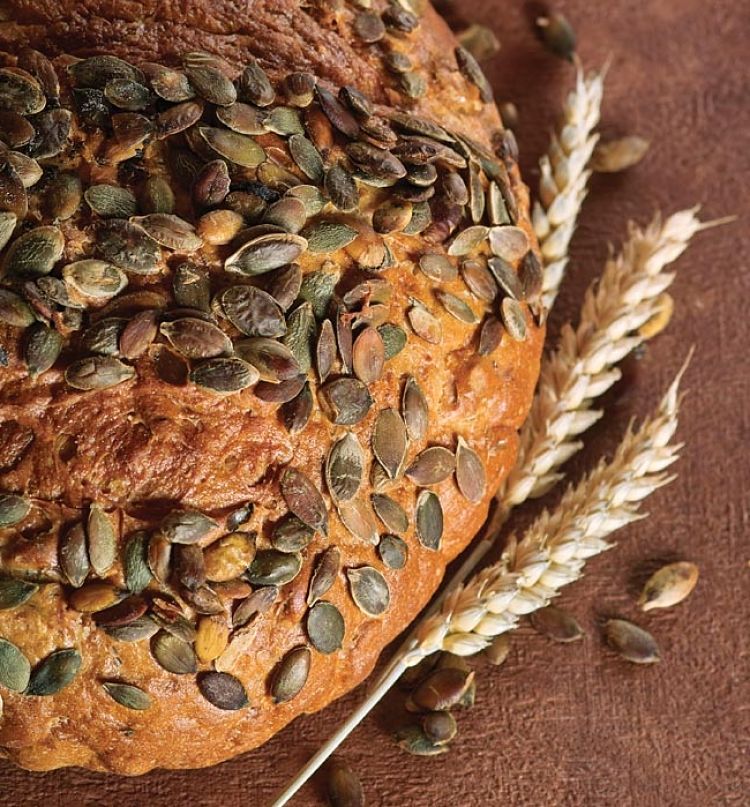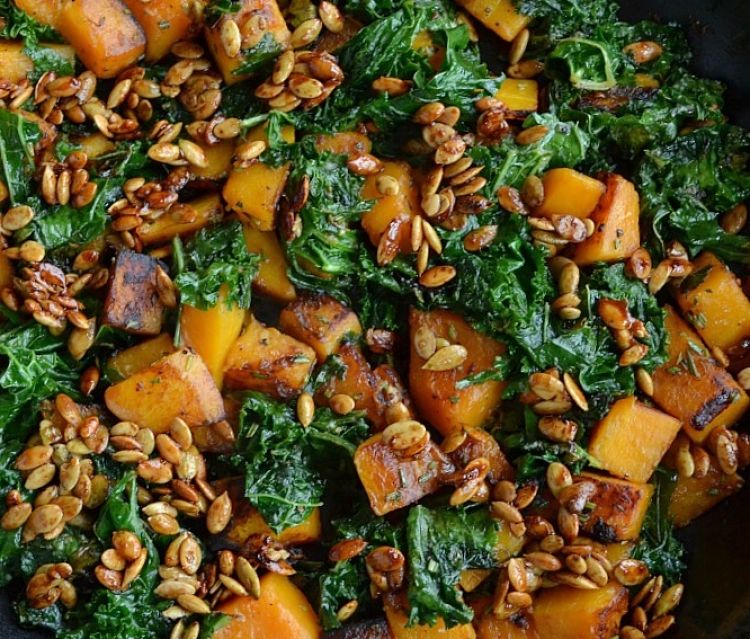Best Pumpkin Seed Recipes - How and Why You Should Use Pepitas More Often
Pumpkin seeds, or pepitas, because of their unassuming appearance, are often discarded when preparing pumpkins for cooking or ignored in the health food store.
This is a big mistake because pepitas are one of the most nutritious edible seeds, packed with fiber and protein, rich in vitamins E and B group and are a good source of minerals such iron, magnesium, copper, manganese and phosphorus.
This article shows you how nutritious they are compared with other seeds.
It also provides tips for enjoying pumpkins seeds in may delightful ways as a whole food, and simply the best ever pumpkin seeds recipes. Enjoy!

Health Benefits of Pepitas and Pumpkin Seeds
The nutrition date for pumpkin seeds is summaried in the table opposite. The table at the end of the article compares the nutritional values of pumpkin seeds (1 oz) with those of common seed and nuts.
Pumpkin seeds are relatively high in calories with about 560 calories per 100 g. The calorie content is lower than most other seeds and nuts, but it is high and is only offset by the value of the nutrients in pumpkin seeds. Most of the calories are derived from protein and fats, not carbohydrates.
The level of protein is higher and fat lower than most of the seeds and nuts, though saturated fat is higher. The fat to protein ratio is also low.
A serving of 100 g or pumpkin seeds provides 30 g which is 54% of the recommended daily allowance.
Pumpkin seeds are an excellent source of many vitamins including Vitamin E, B-group vitamins and folate.
The seeds are also a great source of minerals particularly copper, manganese, magnesium, potassium, zinc, calcium and selenium.
Culinary Uses of Pumpkin Seeds
You can collect and dry your own seeds, and they are available in various dried forms in the stores right throughout the year. The pumpkin seeds are available as whole seeds, hulled seeds, as well as roasted and salted forms (pepitas). Various colors and flavours are available. While buying bulk whole seeds look for ones that have a uniform size, are plump and compact and feel heavy in the hand. Avoid small seed that is shriveled, thin, or shown signs of cracks, mold and excess hulks.
Some of the many uses of Pumpkin Seeds and Pepitas are:
- The raw or toasted kernels make healthy snacks when added to dried fruit and nuts. They can also be added to salads, stir-fries and even to pasta sauce. They add extra flavor and crunch. Roasted whole seeds can be flavored with salt, lemon, lime, seaweed and a variety of herbs and spices such as chilli.
- They can be combined with, or replace other nuts and seeds in a variety of breakfast granolas, breads, cookies, biscuits, slices. They are also an excellent addition to homemade health snack and protein bars, and can be added to healthy smoothies. The high protein and range of nutrients boosts the nutrition in baked goods, curries and casseroles.
- Pumpkin seeds and pepitas make a welcome addition to a wide range of dessert and cakes and to virtually all baked goods and confectionary.
Best Ever Pumpkin Seed Recipes
If do not like chewing the hulls, you can easily find de-hulled varieties. The hulls soften during cooking of many baked goods and when they are added to casseroles and stews. Many people like the crunch.
How to Roast Pumpkin Seeds - The Best Way
Essential Tips
- Pre-cooking the pumpkins seeds by boiling is worth the extra effort as the seeds are crunchier and absorb the spices and seasonings better.
- Using high temperature during the roasting is much better
- Strong flavored seasonings, even chilli, cayenne and chipotle powder are better than trying to use delicate flavours like paprika or garlic. Savory seasonings work better than sweet.
- Watch the seeds in the oven and don’t overcook them.
- Don’t be tempted to over-salt your seeds as this does not work and makes them too salty on the outside.
- Neutral flavoured oils that do not smoke at high temperature such as grape seed or rice bran oil is better than either butter or olive oil. Butter does not add the crisp and crunch that occurs with a good quality oil as well as the oil did.
Ingredients
- 1 Cup of Pumpkin Seeds
- 2 tablespoons of salt, for boiling
For baking
- 1/2 teaspoon of salt,
- 1 tablespoon of rice bran or grape seed oil (or similar high smoking point oil)
- 1/2 teaspoon chipotle powder
- 1/4 teaspoon of garlic powder (optional)
- 1/8 teaspoon cayenne pepper
- Pepper to taste
- Other alternative seasonings and spices to taste
If using your own fresh seeds, scoop them out from the inside of the pumpkin. Place them in a bowl and wash to remove the flesh and strings. Dry on paper towels. You can use raw packaged pumpkins seeds that you purchase.
Preheat your oven to 400 degrees F (200 degrees C). Add 4 cups of water for each cup of seeds in a saucepan and bring to the boil. Add 2 tablespoons of salt for every 1 cup of seeds and simmer the seeds for 10 minutes. Drain the seeds when hot through a sieve and spread on paper towels to dry.
Transfer the seeds to a small bowl, add the oil salt and spices and mix well to coat all surfaces. Spread the seeds out flat onto a baking tray and roast in the oven for 20 minutes (turning twice). Check after 15 minutes to ensure the seeds do not get too dark or start to burn turning. Then transfer to a plate to cool.
Sprouted Spelt and Seed Bread with Pumpkin Seeds
This is modern version of Essene bread, that is a very heavy, but delicious whole-grain seed bread that has a crazy, chewy and nutty taste.
-
1/2 cup grated carrot
-
1/2 cup golden raisins
-
1/2 teaspoon salt
-
Olive oil
-
1/4 cup flax seeds
-
1/4 cup unhulled sesame seeds
-
1/4 cup raw pumpkin seeds
-
1/4 cup raw sunflower seeds
-
2 cups spelt berries
To sprout the seeds, put the spelt, pumpkin seeds, sunflower seeds, flax seeds and sesame seeds into a large jar and cover with warm water. Allow to soak overnight and in the morning drain off the water through a fine sieve. Cove the top of the jar with a piece of cheesecloth, secured with an elastic band. Place the jar on its side and leave in a warm place out of the sun. Repeat the rinsing in the evening by adding water through the cheesecloth and draining.
The following day spread the seeds out onto a baking sheet and dry in a warm oven.
Allow the raisins to soak in water for an hour or so and then drain. Blend the sprouted grain mixture in small batches in a food processor or blender. Combine the raisin and grated carrot with the mixture and shape into a rectangular loaf. Roll the loaf in pumpkin and sesame seeds and place on an oiled baking sheet covered with baking paper. Bake for 2 1/2 to 3 1/2 hours in a low oven, pre-heated to 225 degrees Fahrenheit (110 degrees C), rotating halfway through. Test for doneness. When cooked it should be firm but not hard. If soft bake for a further 30 minutes. Cool completely before slicing and serving.
Sweet Potato and Tempeh Stew with Yogurt and Roasted Pumpkin Seeds
- 1 cup plain yogurt, divided
- 8 ounces tempeh, cut into 1/2-inch cubes
- 3 cups vegetable stock or water
- 2 pounds sweet potatoes, peeled and cut into 1/2-inch cubes (about 4 cups)
- 1/4 teaspoon salt
- 1/4 teaspoon red pepper flakes
- 1 teaspoon coriander seeds
- 6 cardamom pods
- 1 tablespoon grated ginger
- 1 clove garlic, minced
- 1 onion, diced
- 1 tablespoon olive oil
- Salt and pepper to taste
- Toasted pumpkin seeds for garnish
Heat the oil in a large, cast iron pan or heavy saucepan. Sauté the garlic and onions until translucent.
Add 1/4 teaspoon salt, red pepper flakes, coriander seeds, cardamom pods and ginger and sauté for an addition 60-90 seconds. Add the broth and sweet potatoes, bring to the boil, then lower the heat and simmer gently for 10 -15 minutes. Add the tempeh and gently cook on a low simmer for an additional 10 minutes, until the potatoes are just tender.
Remove from heat, season with salt and pepper to taste, and add 1/2 cup yogurt and mix well. Garnish extra pumpkin seeds and yogurt and serve.
Pumpkin Seed Pesto Recipe – Crunchy and Delicious
- 2 tablespoons extra virgin olive oil
- 3 tablespoons of lemon juice, freshly squeezed
- One cup of fresh parsley
- One cup fresh basil leaves.
- 2 - 4 cloves of peeled garlic
- Quarter of a cup of semi-dried tomatoes
- One cup of raw pumpkin seeds
- Cracked pepper and salt to taste.
Transfer the garlic, pumpkin seeds and sun-dried tomatoes into the bowl of a blender or food processor and pulse very briefly to coarsely chop the ingredients. Add the basil, parsley, oil, lemon juice, salt and pepper. Push the ingredients down inside the bowl and pulse lightly to blend (don’t overdo it as you don’t want a smooth paste). You decide how course or fine you want the pesto to be.
Grilled Chicken with Spicy Pumpkin Seed Sauce
- 2-3 skinless, boneless, chicken breasts cut into halves (6 to 8 ounces each)
- 1/2 cup fresh cilantro (coriander) leaves
- 1 tablespoon white-wine vinegar
- 1 1/2 cups packed chopped romaine lettuce (2 ounces)
- 1/4 cup raw green pumpkin seeds
- 1 jalapeno chili, chopped (seeds and ribs removed for less heat, if desired)
- 1 garlic clove, minced
- 1/4 cup chopped onion
- 2 tablespoons olive oil
- Coarse salt and ground pepper
Sauté the garlic, onions and jalapeno in 1 tablespoon of oil in a medium size saucepan until soft and translucent. Add the pumpkin seeds and cook for about 5 minutes until the seeds become puffed. Add the vinegar and lettuce, and 1 cup water and season with 1 teaspoon salt and some pepper. Boil the mixture and then simmer, covered for about 10 minutes until the lettuce is soft.
Put the mixture in a blender bowl, add the cilantro and blend until the sauce is smooth and creamy.
Grill the chicken coated in oil, turning once, until it is cooked and browned (about 6 - 8 minutes per side). Serve with the sauce.
Roasted Squash with Balsamic Vinegar, Mint and Pepitas
- 1/4 cup of fresh mint leaves, roughly chopped
- 1 tablespoon of balsamic vinegar
- 1/4 cup of pepitas
- Sea salt and freshly-ground black pepper
- extra virgin olive oil
- 1 kabocha squash ( or equivalent)
Preheat your oven to 425 degrees F (220 degrees C). Cut the squash into 2.5 cm (1 inch) thick wedges. Leave the skin on but remove the seeds. Toss the squash pieces in a bowl a few tablespoons of olive oil, pepper and salt, until well coated. Place the squash wedges onto a lined baking sheet and roast for about 30 minutes. Test for doneness after 20 minutes. The wedges are cooked when they can be easily pierced with a fork and are light brown on the outside.
Heat one tablespoon of olive oil in a small frying pan and fry the pumpkin seeds over medium-high heat for 4-5 minutes. Dry the seeds on paper towel and season pepper and salt. To serve drizzle with balsamic vinegar, mint and pepitas.
Mixed Nut and Seed Bar with Sunflower and Pumpkin Seeds
- 1 tablespoon splenda brown sugar blend
- 3 tablespoon brown rice syrup
- 1/4 cup agave nectar
- 1/8 cup raisins and
- 1/2 cup sunflower seeds
- 1/2 cup pumpkin seeds
- 1 cup whole almonds
- 1 cup sesame seeds toasted
Combine all the ingredients well. Spread onto a baking pan, lined with baking paper. Bake at 250 degrees F (120 degrees C) for about 15 minutes. Cool and cut into 16 pieces .
Sultana and Almond Cookies with Pepitas
- 2 tablespoons of pepitas, toasted
- 1/4 cup sliced almonds, toasted
- 1/2 cup of Sultanas or Raisins
- 1 1/4 cup self-raising, baking flour (wholemeal preferred, or 50:50)
- 1 large egg
- Sea salt
- Grated nutmeg or ground nutmeg
- 1 teaspoon of vanilla
- 3/4 cup of brown sugar
- 1/2 cup unsalted butter, warmed to room temperature
Beat the sugar and butter until light and creamy (about 2 minutes on high). Add the vanilla and egg and beat again. Sift the flour and salt. Gradually add the flour and the remaining ingredients to the wet mixture. Fold in the sultanas, pepitas and almonds. Turn the mixture out onto a sheet of parchment paper and roll to form a log shape. Seal by twisting ends together and refrigerate for at least 3 hours, or 1-2 days. Preheat your oven to 350 degrees F (175 degrees C). Line oiled baking sheets with parchment. Cut the unwrapped dough log into thin slices and place well spaced on the baking sheets. Bake for about 15-20 minutes, or until they just begin to become golden brown at the edges. Cook on a wire rack and serve.
Nutrient Data for 100g of Pumpkin Seeds (Pepitas)
|
Nutrient (100g serving)
|
Value
|
% of Recom. Daily Allowance
|
|---|---|---|
|
Energy
|
559 Cal
|
28%
|
|
Carbs
|
10.7 g
|
8%
|
|
Protein
|
30 g
|
54%
|
|
Total Fat
|
49 g
|
164%
|
|
Cholesterol
|
0 mg
|
0%
|
|
Dietary Fiber
|
6 g
|
16%
|
|
Vitamins
|
****
|
****
|
|
Folates
|
58 mcg
|
15%
|
|
Niacin
|
5.0 mg
|
31%
|
|
Pantothenic acid
|
0.75 mg
|
15%
|
|
Pyridoxine
|
0.14 mg
|
11%
|
|
Riboflavin
|
0.15 mg
|
12%
|
|
Thiamin
|
0.27 mg
|
23%
|
|
Vitamin A
|
16 IU
|
1%
|
|
Vitamin C
|
1.9 mcg
|
3%
|
|
Vitamin E
|
35 mg
|
237%
|
|
Electrolytes
|
****
|
****
|
|
Sodium
|
7 mg
|
1%
|
|
Potassium
|
809 mg
|
17%
|
|
Minerals
|
****
|
****
|
|
Calcium
|
46 mg
|
5%
|
|
Copper
|
1.3 mg
|
149%
|
|
Iron
|
8.8 mg
|
110%
|
|
Magnesium
|
592 mg
|
148%
|
|
Manganese
|
4.5 mg
|
198%
|
|
Phosphorus
|
1233 mg
|
176%
|
|
Selenium
|
9.4 mcg
|
17%
|
|
Zinc
|
7.8 mg
|
71%
|
|
Phyto-nutrients
|
****
|
****
|
|
Carotene-beta
|
9 mcg
|
|
|
Crypto-xanthin-beta
|
1 mcg
|
|
|
Lutein-zeaxanthin
|
74 mcg
|
|
Comparison of the Nutrients in Pumpkins Seeds with other Common Seeds and Nuts
|
Nut/Seed (1 oz)
|
Calories
|
Tot. Carb (g)
|
Protein (g)
|
Fiber (g)
|
Total Fat (g)
|
Sat. Fat (g)
|
Mono Fat (g)
|
Fat to Protein Ratio
|
|---|---|---|---|---|---|---|---|---|
|
Pumpkin Seeds
|
151
|
5
|
6.9
|
1.1
|
13
|
2.4
|
4
|
1.28
|
|
Sesame Seeds
|
160
|
6.6
|
7
|
3.3
|
17.5
|
1.9
|
5.3
|
2.77
|
|
Sunflower Seeds
|
164
|
5.6
|
7.2
|
2.4
|
16
|
1.2
|
5.2
|
2.48
|
|
Walnuts
|
183
|
3.8
|
3
|
1.9
|
26
|
1.7
|
2.5
|
4.22
|
|
Pine Nuts
|
188
|
3.7
|
3.9
|
1
|
19
|
1.4
|
5.3
|
4.2
|
|
Pistachios
|
156
|
7.8
|
7
|
2.9
|
12
|
1.5
|
6.5
|
2.2
|
|
Peanuts
|
159
|
4.5
|
9
|
2.4
|
17
|
1.9
|
6.8
|
1.89
|
|
Cashews
|
155
|
9.2
|
5.3
|
0.9
|
16
|
2.2
|
6.7
|
2.44
|
|
Almonds
|
161
|
6.1
|
7.7
|
3.4
|
17
|
1
|
8.6
|
2.35
|
|
Brazil Nuts
|
184
|
3.4
|
5.5
|
2.1
|
23
|
4.2
|
6.9
|
4.63
|
|
Pecans
|
193
|
3.9
|
3
|
2.7
|
23
|
1.7
|
11.4
|
7.8
|
|
Hazelnuts
|
176
|
4.7
|
5.3
|
2.7
|
17
|
1.3
|
12.8
|
4.12
|
|
Madadamia Nuts
|
201
|
4
|
3
|
2.4
|
25
|
3.4
|
16.5
|
9.27
|
